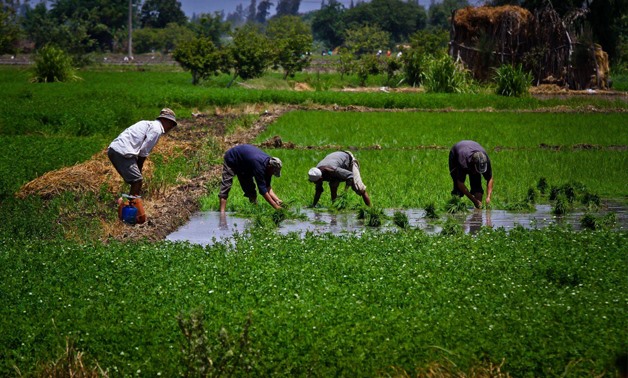COVID-19 has pushed Egyptians migrant workers who would normally support their families by working in GCC countries or Europe back home and into the fields, slashing remittance income for poor farming families and cutting agricultural output.
Agriculture is considered the most resilient sector of Egypt’s economy but that has not stopped poor farming families from feeling the brunt of the global COVID-19 pandemic. In April, the International Food Policy Research Institute (IFPRI) warned that poor households—and especially those in rural areas— would likely suffer the most from lower remittances.
Two months on, farmers such as Abdel-Qader Mustafa, from Qena in Upper Egypt, are feeling the reality of the global economic crisis caused by COVID-19.
Mustafa’s son used to work in Saudi Arabia, sending back roughly LE 2,000 ($124) to supplement his family’s income each month.
“Due to the coronavirus, my son could not go back to his work in Saudi Arabia after the end of his annual vacation in February. Since then, he has been taking money from us,” Mustafa told Egypt Today.
As a result, all seven members of Mustafa’s family have been pushed back into working the agricultural fields where they earn as little as LE 15 to LE 20 ($0.90 to $1.20) per day.
Mustafa’s son is amongst the 20,000 Egyptian workers that have been either repatriated or deported from Gulf Cooperation Countries and European nations as a result of COVID-19 shutdowns and declining oil revenues.
Egypt’s higher-income households who rely mostly on the services sector for their income have seen the largest COVID-19 losses in absolute terms, but the IFPRI says “the poor may find it harder to cope.”
The rural-urban differentiation
“Rural households also lose, but less than their urban counterparts.” IFPRI says this is explained mostly by stronger economic growth in the agricultural sector and its ability to keep operating through the virus crisis.
“While the income losses of the rural and urban poor are smaller compared to the non-poor in absolute terms, poor households are likely to find it harder than wealthier households to cope with such income losses.”
That is in part because they already have significantly lower monthly incomes than their urban counterparts, meaning even a small reduction could push them closer to poverty. They are also more heavily reliant on remittances, a fact that Egyptian Farmers Syndicate chief Hussein Abdel-Rahman says is having a big impact on farming families.
Abdel-Rahman recognizes “the decline in remittances would have a great impact on Egypt generally,” but says farmers and their families who constitute 55 million citizens, around 50% of Egypt’s population, are really feeling the pinch.
“The plunge of the remittances led to weakness in the purchase power and a decline in the living conditions in the rural areas,” he told Egypt Today on Thursday.
The union boss also reports that the drop in remittances, and income more generally, has led to a decrease in cultivation with farmers planning to plant three instead of the usual five feddans (1 feddan = 1.037 acres) this year. According to Abdel-Rahman, reduced purchasing power is already pushing poor rural Egyptians towards low-quality imported meat, and lower crop plantings could drive food prices up further in the future.
Another factor creating hardship for rural Egyptians are limits on cash withdrawals.
“Also, farmers sometimes find difficulties in taking the remittances as he/she is not allowed [by the banks] to withdraw all [the] amount of the remittances at once from banks,” Abdel-Rahman said.
Read also: Lebanon and Egypt to Suffer Severe Impacts of COVID-19 Remittances Slump





